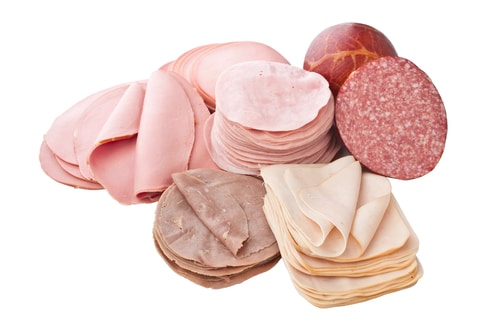
Processed Meats Are a Cancer Risk
Most people would rather not deal with the big “C,” and processed foods have been linked with increased cancer risk. A study published in the Journal of the American Medical Association showed that eating red meat, and particularly processed meat, increases the greater risk for colon cancer. Another study found a link between processed meats and stomach and pancreatic cancer. Still another study found that kids who munched on more hotdogs, a classic example of processed meat, developed more childhood cancers.
How does processed meat boost cancer risk? Processed meat contains preservatives that are converted in the digestive tract to nitrosamines, chemicals that are known carcinogens. Frying meat further increases the number of nitrosamines in meat even further. Interestingly, another place you find nitrosamines is in cigarette smoke.
It’s Too High in Sodium
When you eat a meal high in sodium your blood vessels expand only half as much to let blood flow through as they do when you eat a low-salt meal. Dietary sodium has been linked with elevated blood pressure and a greater risk for heart disease in some studies – and the processed meat you buy at the supermarket and at deli counters is just loaded with it. Processed meat has almost four times the amount of salt as unprocessed meat. No wonder most people feel thirsty after they eat it.
Considering the average serving of processed meat contains almost 600 milligrams of sodium on average and daily sodium consumption should be 2,300 milligrams or less, it’s not hard to see why processed meat leaves a “salty” taste in your mouth.
It May Shorten Your Lifespan
When researchers followed the eating habits of more than 120,000 men and women over a 28-year period, those who ate more red meat, particularly processed meat, had a higher mortality rate. Not only is processed meat high in sodium, it frequently contains large amounts of saturated fat. Saturated fat is a less healthy form of fat than monounsaturated fats in olive oil and nuts and omega-3 fats in fatty fish. Plus, red meat contains substantial amounts of palmitic acid, a fatty acid that turns off the signals that tell you to stop eating. It does this by blocking the action of the appetite hormone leptin on the brain. To make matters worse, processed meat increases the risk of heart disease and type 2 diabetes.
The “Yuck” Factor
If the threat of health problems doesn’t convince you to cut back on processed meat, the “yuck” factor might. Some ground beef and processed meats contain “pink slime.” To salvage all the meat from the cow, meat processors heat the fat trimmings from the cow to separate out any remaining meat. The “meat” is then treated with ammonium hydroxide to destroy any bacteria. The resulting product is mixed into processed meat to bulk it up. So unappetizing is this prospect that some schools have banned “pinks slimy” processed meat. Some forms of processed meat are really just “pieces” meat held together by fillers and chemical additives. Not very appetizing, is it?
The Bottom Line?
If you can’t completely eliminate processed meats from your diet, at least limit how much you eat and balance it by eating more fruits and vegetables. Even better, choose grass-fed organic beef and unprocessed, organic chicken and turkey, and round it out by eating wild-caught salmon as a source of protein to get more omega-3 fats.
References:
International Journal of Cancer. Volume 80, Issue 6, pages 852-856, 15 March 1999.
AMA. 2005;293(2):172-182. doi:10.1001/jama.293.2.172.
Int J Cancer. 2006 Aug 15;119(4):915-9.
J Clin Invest. 2009;119(9):2577-2589. doi:10.1172/JCI36714.
CNN Health “Study: Too Much Red Meat May Shorten Lifespan”
Related Articles By Cathe:
Explaining the Possible Link Between Processed Meats and Cancer
As always very helpful information thanks Cathe!!
I believe this article is true! My Dad was a huge fan of hotdogs and ended up with pancreatic cancer. I do think it was one of the factors in his health. Sorry to say that he did pass away a year after being diagnosed. If you have a choice – make the healthy one.
Thank you for writing this, very important information.